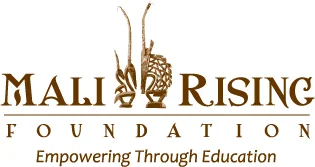Access to education is one of the most powerful tools for change, and textbooks are a vital part of that equation. In Mali's rural middle schools, the scarcity of textbooks presents a significant challenge for teachers and students alike. Without adequate resources, lessons are harder to teach, students are slower to understand, and time in the classroom is less effective overall. Thanks to a generous gift from the Maxfield Family Foundation, at Frances W. Burton Middle School — and at all Mali Rising schools — this challenge is now a little easier to overcome.
A Village Steps Up for Their Girls
Now that the school year is well underway in Mali, I have been checking in with mothers involved in our Girls’ Project Mothers Loan Funds. These funds use revolving credit to help mothers establish small businesses, and the interest is used to pay girls’ school fees. While visiting with the mothers in Tamala, they told me the story of Sitan Samake as an example of the huge changes the Girls’ Project has created in their village.
Celebrating the End of the Year With Our Girls
Our Girls’ Project works intensively in a group of villages for 3 years before moving on to a fresh set of villages. As this school year ended, we said goodbye to five intensive partner villages with big community celebrations. During these celebrations, several mothers of students testified about the success of their daughters thanks to the Girls’ Project..
Girls Compete for Top Reader Honors!
A key, new part of our Girls’ Project focuses on helping participating girls learn to read – and to love reading! This campaign -- Great Girls Read – works with girls all school year long to help them improve their reading skills and find joy in reading fun and engaging short pieces designed just for them. As the school year ends, the girls competed in a reading contest and crowned their top readers!
Great Teachers Make Great Schools
Mali’s teachers face many unique challenges, such as class sizes of more than 100 students and a lack of textbooks. But one challenge they face is one that any teacher around the world would recognize – how to engage their students and encourage questions and discussion. At a recent Mali Rising Teacher Training, we tackled this exact problem and inspired one young teacher -- Benzamé Sanou – to return to his classroom with new ideas and new energy.
A Little Reward Goes a Long Way
Encouraging and recognizing good work done is an effective way to develop a taste for learning. Indeed, reward is an extrinsic motivator that prompts the student to improve certain behaviors, providing conditions that facilitate their motivation and learning.
It is in this context that the Girls’ Project gave gifts to 15 most outstanding girl students from last school year in the five villages of Girls’ Project -- Zambougou, Sebela, Dorila, Tamala and N'Tentou. This was done both to reward the girls for their hard work and to create competition among all the girls to study hard.
When Doing it Yourself Feels Good
When Mali Rising builds a new school, student desks are part of the equipment provided to the school. This is an obvious need – it is hard to make the most of a classroom if you do not have anywhere to sit! However, solving one problem can sometimes create other challenges. We have a new campaign underway to keep school desks in good shape, and I’d like to tell you about that campaign today.
Mothers Taking Action for Their Daughters
In most rural villages in Mali, women play a fairly important role in taking charge of children's school fees. But to save money, many men prefer to enroll only boys in school and prefer girls stay at home with their mother. Yet who pays the students' tuition fees? In the majority of our schools, women pay school fees. To raise funds for the fees, women may cut firewood, pick shea nuts to make shea butter, grow vegetables in gardens to sell at the market, or grow. These hard-working mothers can do amazing things for thier kids…with just a tiny bit of help!
We Need Both Girls & Boys To Change the World
What do the students themselves think about their education and the education of girls in particular? For a long time Malian children had no idea of the importance of their education. Today with the advent of technology and more discussions about the subject, children are becoming aware of the importance of their education. However, gender equality in education is a subject that still needs more discussion in our villages. Not everyone is convinced that both boys and girls have the right to an education. As part of the Girls Project, I helped lead a debate among the boys from the school in Tamala around the topic of girls' education.
Helping Girls Find the Space & Quiet to Learn
The Girls Project focuses on enrolling more girls in school, but it also aims to help those girls succeed once they are in the classroom. To help our girls, we organize regular study meetings. This allows girls to learn techniques to better understand their lessons, with a particular focus on what the girls identify as the difficult parts of the subjects. The Study Groups are new for the Girls Project this year. It is in the spirit of creativity that we introduced them into our activities, after finding that the girls have deficiencies in learning their lessons when trying to study after class.


